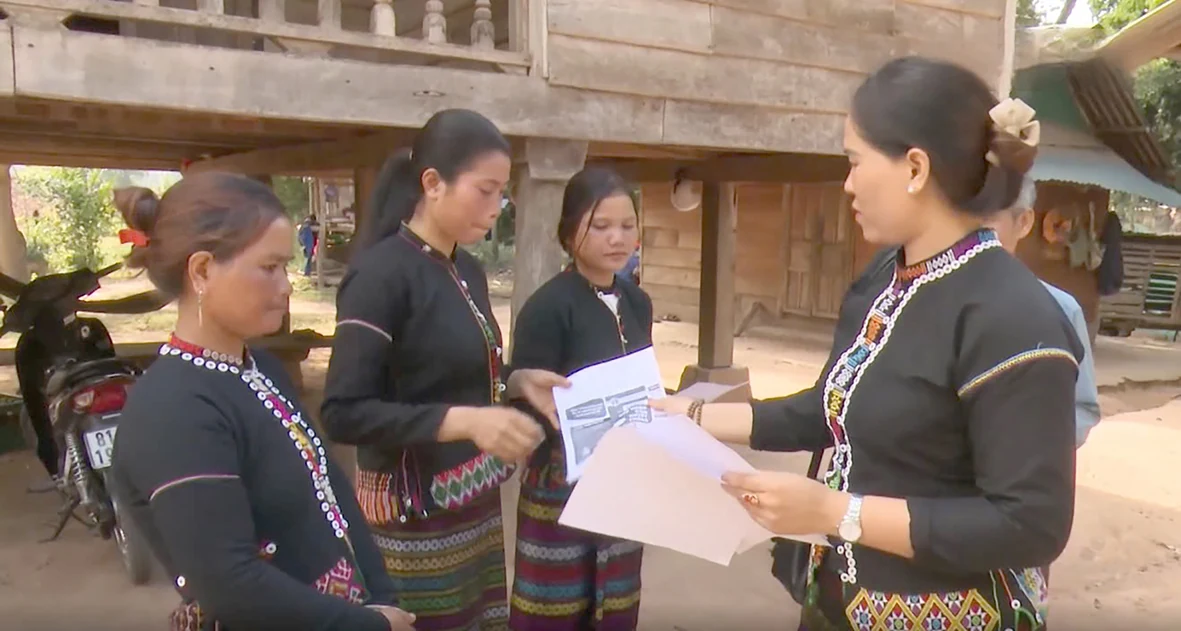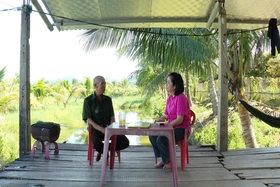{title}
{publish}
{head}
"Drugs – a threat to the community. Stay away from drugs for the sake of future generations, for your own happiness, and for the well-being of your family and society." This slogan for drug prevention highlights a deeply alarming reality: the illegal trafficking, transportation, and use of narcotics remain complex and unpredictable issues, posing significant challenges to drug prevention and control efforts.
To collectively push back against drug abuse, with the support of Project 8, the Quang Tri Provincial Women’s Union has intensified grassroots-level communication campaigns in remote villages and ethnic minority communities. The goal is to raise public awareness of the dangers of drugs, encouraging people to stay away from illegal drug trafficking, transportation, and use — thereby protecting themselves, their families, and society.

Members of the community communication groups in Huong Hoa travel to villages to raise awareness and encourage local residents to comply with the law. Photo: V.T.H
In recent years, drug-related crimes have been on the rise and have become increasingly complex. Criminals have taken advantage of the limited awareness of ethnic minorities about drugs, hiring them to transport narcotics from Laos to Vietnam. Many ethnic minority individuals, particularly those who are impoverished, unemployed, or already struggling with addiction, are lured into transporting drugs in exchange for money. Alarmingly, the number of ethnic minority individuals caught transporting drugs has increased significantly.
In 2024, authorities uncovered and arrested 16 individuals in 11 cases, seizing 71,368 pills, 100 kilograms of synthetic drugs, and 35 kilograms of heroin. These figures represent increases of 2.5 times the number of cases, 2.67 times the number of individuals, and 4.6 times the quantity of drugs compared to 2023. Among the arrested, 65 out of 358 were from ethnic minority groups, accounting for 18.1% — a 2.6-fold increase from the previous year.
Drugs have devastating consequences for both individuals and society. Substance abuse not only deteriorates physical health but also severely impacts mental well-being, family relationships, and the broader community. Drug users are more likely to suffer from cardiovascular diseases, neurological disorders, and infectious diseases. Almost all narcotic substances, when abused, affect the brain’s conditioned reflex system. Hallucinations and violent behavior are common among users.
Clinically, heroin abuse can lead to brain damage and reduced blood flow in the brain. Moreover, drug-related crimes such as theft and domestic violence tend to increase in communities affected by addiction. Therefore, drug prevention is not the sole responsibility of law enforcement. It requires the active participation of all stakeholders — from government agencies and mass organizations to families and society — especially to curb addiction among youth and drug-related issues in ethnic minority areas. The ultimate goal is to create a safe and healthy environment for women, children, and all community members.
Following Plan No. 120/KH-BTV issued on March 19, 2025, by the Standing Committee of the Quang Tri Provincial Women’s Union, the Union has rolled out community outreach campaigns targeting local communication teams, committee members, and residents. These initiatives aim to raise awareness and drive behavioral change in drug prevention.
Recognizing ethnic minorities and mountainous communities as vulnerable groups susceptible to enticement into drug crimes, the Provincial Women’s Union has worked with district and commune-level unions to organize drug prevention campaigns at the commune and village cluster levels. Each round of the campaign is implemented in multiple locations to foster community-wide awareness. The objective is to spread the message across every household — for everyone to say no to drugs and drug-related crimes.
In addition to disseminating legal provisions on drug prevention, the campaigns focus on directly warning residents about the consequences and harms of drug abuse, especially the threats posed by synthetic drugs, psychoactive substances, and drugs disguised or mixed into food, drinks, e-cigarettes, modern tobacco products, and shisha. They also educate people about the tactics criminals use to lure individuals into drug activities, and how to recognize, prevent, and report drug-related crimes to the authorities.
The content and delivery methods of the communication materials have been carefully designed to be diverse, easy to understand, remember, and apply — tailored to different demographics and local contexts, especially in border areas where the risk of drug infiltration is high and residents are frequently targeted by traffickers. Information technology is being increasingly utilized to make the messages more accessible to all.
Another crucial focus of these campaigns is supporting drug addicts in returning to a normal life. The Union promotes various rehabilitation approaches, such as community-based, family-based, and institutional treatment. While the determination of the individual is key to recovery, the emotional support of family and community plays an essential role in helping them overcome addiction.
The Union’s communication efforts also stress the importance of prevention through the combined power of personal resilience, family care, and social support to create a positive living and working environment that protects individuals from falling into drug addiction.
Nguyen Thi Que Phuong, the Standing Vice Chairwoman of the Quang Tri Provincial Women’s Union, stated that the communication campaign aims to create a strong shift in awareness and enhance the responsibility of all levels of government, sectors, families, and communities — especially women and children in ethnic minority areas — in combating drug abuse.
The campaign seeks to reduce legal violations and drug-related social problems, gradually putting an end to these social evils. In doing so, it contributes to building prosperous, equal, progressive, happy, and sustainable families. The organization of these campaigns is cost-effective, practical, and tailored to local realities, ensuring high communication impact.
These campaigns aim to foster a strong sense of responsibility among citizens — especially women — in building a drug-free community. The momentum generated by these outreach efforts will be sustained by the Community Communication Teams, who will continue to spread the message across every village and neighborhood, making each day a step closer to a better, safer, and more fulfilling life for all.
Project 8 is one of ten sub-projects under the National Target Program for the Socio-Economic Development of Ethnic Minority and Mountainous Areas for the period 2021–2030, with Phase I running from 2021 to 2025 (referred to as the Program), approved under Decision No. 1719/QD-TTg by the Prime Minister. The project aims to raise awareness, eliminate prejudice, improve the material and spiritual well-being of women and children, ensure their protection and care, promote gender equality, and address urgent issues affecting women and children in ethnic minority and mountainous areas.
The project is being implemented across 187 villages in 37 communes within five mountainous districts and communes in Quang Tri Province. These include Vinh Linh, Gio Linh, Cam Lo, Dakrong, and Huong Hoa. Specifically, the coverage includes one commune in Zone I (Tan Lap, Huong Hoa District), two communes in Zone II (Ba Long in Dakrong District and Vinh Ha in Vinh Linh District), and 28 communes in Zone III, including Thuan, Thanh, Lia, Xy, A Doi, Ba Tang, Huong Loc, Huc, Huong Tan, Huong Linh, Huong Phung, Huong Son, Huong Lap, and Huong Viet in Huong Hoa District; Ba Nang, Ta Long, Huc Nghi, A Bung, Ta Rut, Huong Hiep, A Ngo, A Vao, Dakrong, Mo O, and Krong Klang town in Dakrong District; Linh Truong in Gio Linh District; and Vinh O and Vinh Khe in Vinh Linh District.
The project has established and continues to support 147 community communication groups. Additionally, it has either strengthened or newly established and maintained 110 village-based savings and loan groups to enhance the effectiveness of gender equality efforts and address issues affecting women and children in the province.
Vo Thai Hoa - Ngoc Mai

QTO - Not letting summer slip by in vain, many students in Quang Tri have taken the initiative to teach English to younger children. Through each lesson,...

QTO - Returning from the northern border front with a 2/4 disability, it seemed his journey of service had come to an end. Yet, this wounded soldier began...